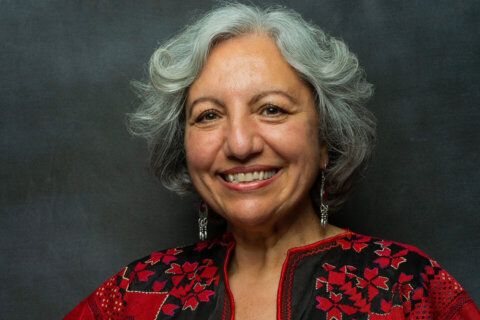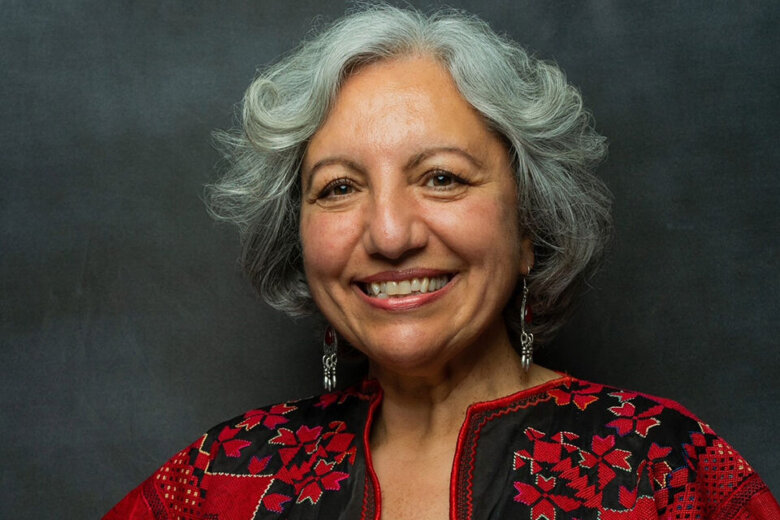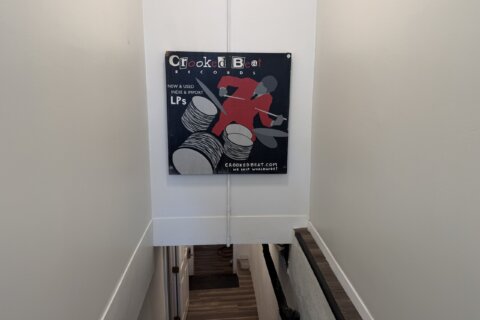This article was republished with permission from WTOP’s news partner InsideNoVa.com. Sign up for InsideNoVa.com’s free email subscription today.

Alexandria Poet Laureate Zeina Azzam first found it difficult to write about the war in Israel amid the ongoing conflict that started last October.
Now, her words about the children of Gaza have been translated into five languages and recited everywhere from senators’ offices to churches, from vigils to protests.
Azzam says she was moved to pen the poem, “Write My Name,” after reading a CNN report about parents in Gaza who had resorted to writing their children’s names on their legs to help identify them should they or their children be killed.
More than 12,300 children in Gaza have been killed since the start of the Israel-Hamas war on Oct. 7, according to the Gaza Health Ministry. The UN agency for Palestinian refugees said that more children have been killed in Gaza in the last four months than children killed in the last four years of war globally.
“It was such an indication of despair and sadness and hopelessness,” Azzam said of the CNN report. “My heart was so devastated.”
“Write My Name” is written in the voice of a child and reflects the reality of parents in Gaza writing their children’s names on their legs for identification. “Use the black permanent marker with the ink that doesn’t bleed,” the child in the poem says.
The last stanza explains why:
“Write my name on my leg, Mama
When the bomb hits our house
When the walls crush our skulls and bones
our legs will tell our story, how
there was nowhere for us to run”
Videos of Azzam and others reciting the poem have hundreds of thousands of views across Instagram, YouTube and TikTok. In December, Azzam read the poem in U.S. Sen. Chuck Schumer’s office.
“When I wrote it, I had no idea it would have that kind of reach,” Azzam said, “And it has made an awareness about what’s going on and how horrific this situation is. Everybody tells me they read it, and they cry.”
This was not the first time Azzam, 68, wrote poetry about the Palestinian territories. Both of her parents were Palestinian refugees who fled in the 1948 Nakba when 700,000 Palestinians left or were expelled from what is now Israeli territory. Those who left were never allowed to return and were forced to settle in camps in neighboring countries, including Azzam’s parents, who moved to Syria. Azzam was born there, and her family moved to Lebanon a short time later. When she was 10 years old, her family immigrated to the United States.
Azzam has written about her parents’ “experiences as displaced, dispossessed Palestinians, having lost their home, and what that was like for them,” Azzam said. “Growing old while they’re holding that terrible experience that was very figural in their lives.”
“My parents were the refugees, and I’m the immigrant,” Azzam said. “But the refugee narrative has been big in my life. I write a lot of poetry about being in between cultures, and in between languages.”
Azzam’s first poetry book, “Bayna Bayna, In-Between,” was published in 2021. “Bayna” is the Arabic word for “between,” and when it’s repeated twice it means “betwixt and between.”
“It’s so moving, so understated,” Azzam’s longtime friend Ida Audeh said about Azzam’s poetry. “People read it at an event, and they’ll start crying because it’s just so moving. She’s a fine, sensitive soul. She’s always thoughtful and things register with her. And then the output is just phenomenal.”
In one poem, “Leaving My Childhood Home,” Azzam recalls moving away from Beirut, gifting her best friend an empty tin box full of their childhood memories, like playing hide and seek and eating falafel sandwiches. She speaks on the feeling of physical impermanence for refugees, comparing her and her friends’ families to weeds needing to be pulled every few years.
Other poems touch on the lighter facets of Palestinian identity, like food.
“She has range,” Audeh said. “Some [poems] are just so playful, one about spices and the way each spice makes an appearance on your palette. I get tickled when I read it. You read it and you just start grinning.”
Last summer, at the launch of Azzam’s latest poetry collection, “Some Things Never Leave You,” her friend and former colleague Mimi Kirk offered remarks.
“I’ve been a friend and great admirer of Zeina’s since we worked together at the Center for Contemporary Arab Studies at Georgetown 15 years ago,” Kirk said. “I often say that I feel honored to be close with Zeina. It feels like such a gift to be her friend, and her poetry is also such a gift.”
Landing in Washington
After immigrating with her parents to upstate New York when she was 10, Azzam attended middle school and high school in a small town called Delmar. She attended college at Vassar in Poughkeepsie before moving to the Washington metro area.
“I felt like Washington offered me an opportunity to address both my identities, as an Arab and as an American,” Azzam said.
She had visited friends in the area a few times a year and decided to apply for the Arab Studies master’s degree at Georgetown University. “I think that indicates how I wanted to learn more about my heritage and my identity and wanted to be that person who understood two cultures and can help with understanding between the two.”
Azzam ended up taking a job at the Arab Studies Center, which she said gave her an opportunity to learn much more about the Arab world, through her work and the large Arab community in Washington. She liked that there was a Palestinian community there and Arabs from all over the Arab world.
“I plugged right into it. I became politically active early on — we’re talking the ‘80s here, standing outside the White House in demonstrations against Israeli policies,” said Azzam, who protested the Israeli invasion of Lebanon in 1982.
Azzam worked with an organization called Palestine Aid Society, which marketed traditional Palestinian tatreez embroidery made by women in Lebanon and the West Bank to an American audience.
“That way, we were able to send money to these women, many of whom had lost their husbands and had no other source of income because of the war,” Azzam said.
Now, she sees using her poetry and Palestinian voice as a responsibility.
“I don’t represent all Palestinians or our values, but I am a voice and I feel a responsibility to make my voice heard in places that may not otherwise hear a Palestinian,” Azzam said.
“I hate the word humanizes. I really hate it,” Azzam said, but she acknowledges that her poetry gives people a perspective on Palestinians other than what they see on the news. “Here’s a Palestinian who is trying to tell the world about what’s going on.”
She’s also been active in Grassroots Alexandria, a community action group, since 2017, working on local issues like affordable housing and keeping police out of schools.
The group is currently calling for the Alexandria City Council to pass a resolution supporting a ceasefire in Gaza.
“In all these years in Alexandria, I knew very few Arab Americans,” Azzam said. “And then all of a sudden, this thing happened with Gaza, and we have 80 people working for Palestinian rights in Alexandria.”
In this difficult time, Azzam feels embraced by her local community.
“We’re all working together hand in hand,” Azzam said. “It’s really so heartening to see that kind of support.”
_______________________________
Mariah Jallad is a graduate journalism student at the Georgetown University School of Continuing Studies.







